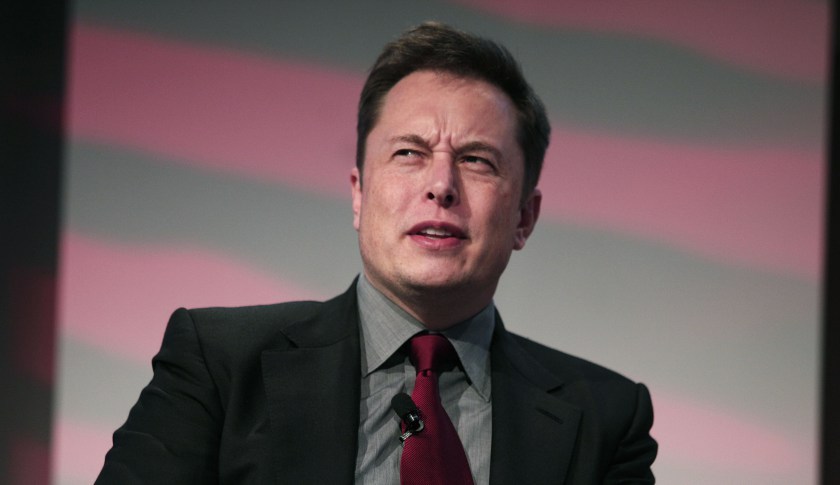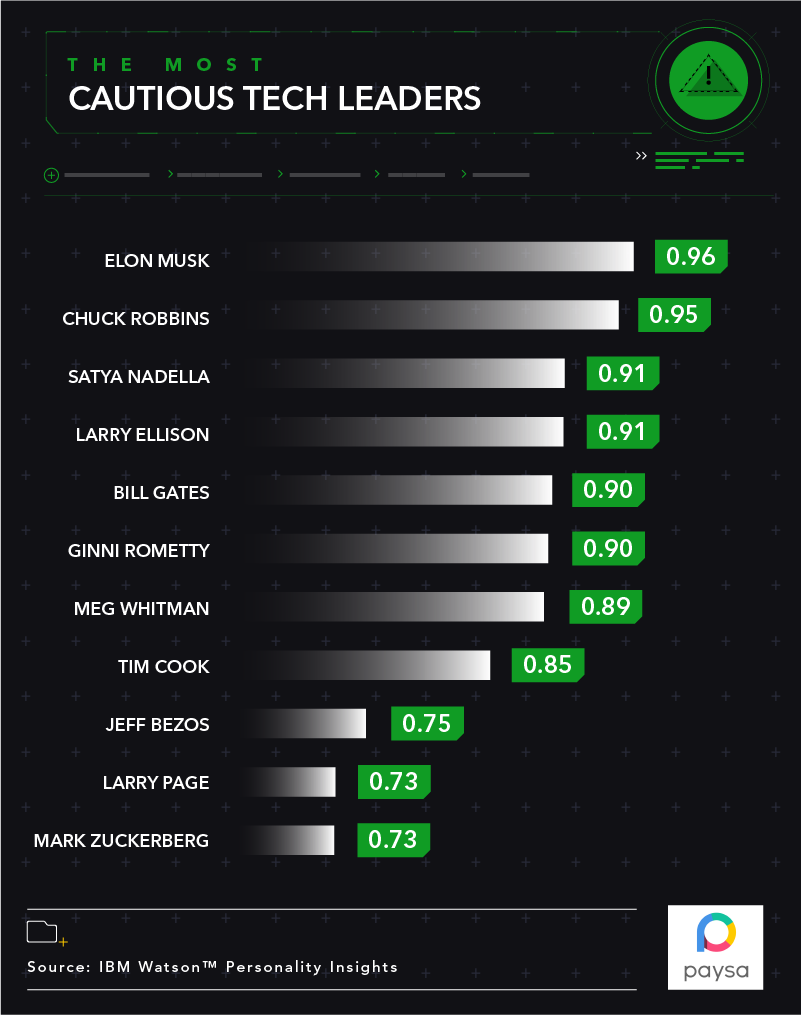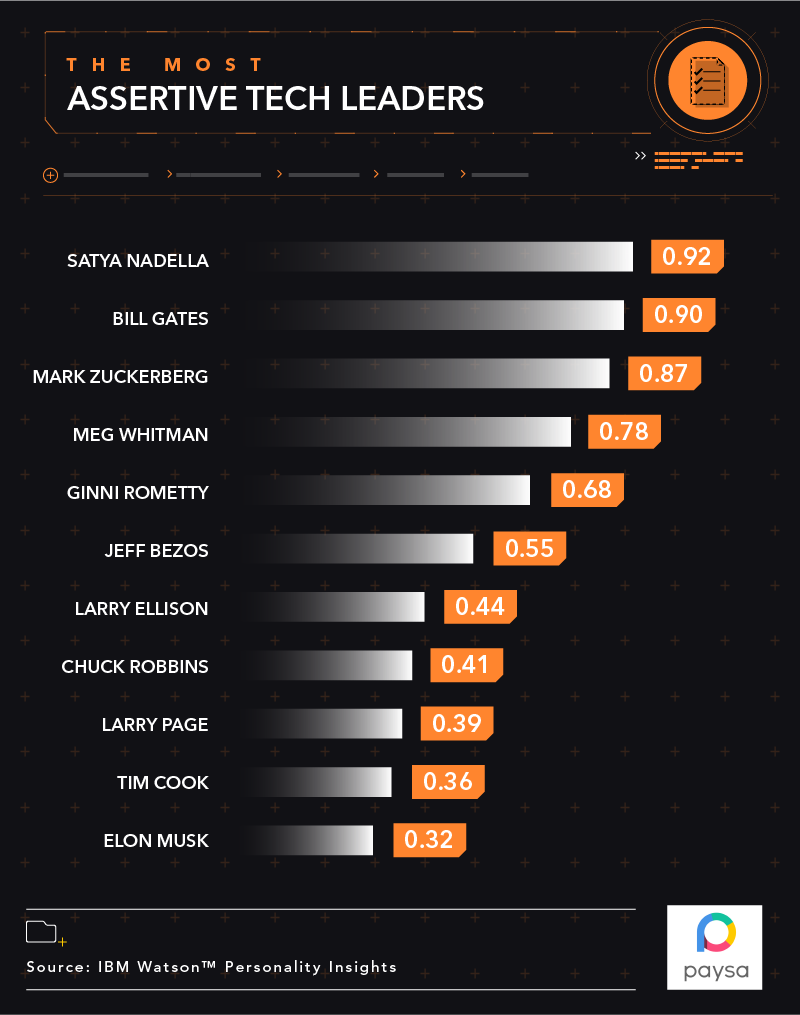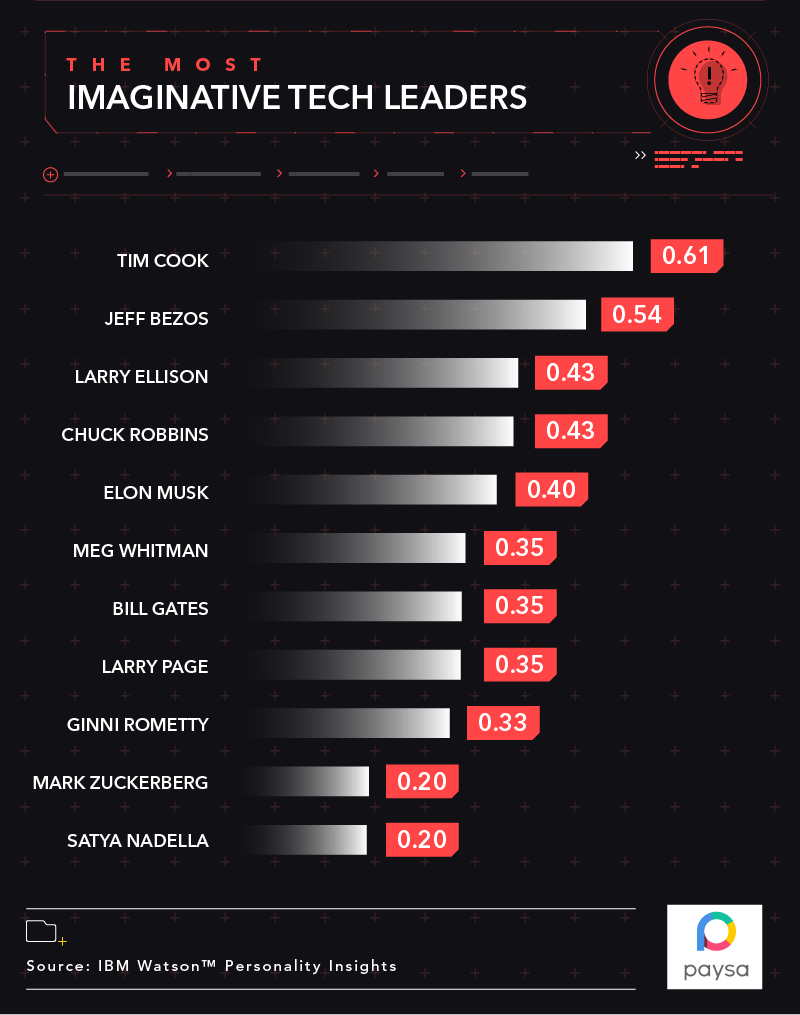(Original title: IBM Watson interviews Silicon Valley CEOs and finds that Musk is the most cautious and Nadera most determined)
What qualities do you want to become the most successful CEO in Silicon Valley? It may be that in many people's minds there are highly educated, far-sighted, capable leaders and meritocracy, but in fact the most necessary quality is prudence.

According to CNBC, the recruiting company Paysa recently used the IBM supercomputer Watson to conduct a survey and analysis, pointing out that “smartness and intelligence†are the most important skills that the top technology companies need to be essential, and “prudence†is also essential.
The personal quality of the CEO will have a great influence on the company. For example, adventure may bring more opportunities, caution may avoid the cost of expensive failure; imagination can lead to amazing technological breakthroughs, etc. Watson gives these Silicon Valley bigwigs a point and gets a small ranking. We select several of the CEO elements to share with you.
Silicon Valley's most cautious CEO is Tesla, SpaceX's Elon Musk. Seeing the results still surprising, Musk gave the impression that he used to be adventurous and has great ambitions. His various bold ideas make it difficult to connect the word cautious with him.
In terms of prudence, the remaining rankings are as follows: Microsoft CEO Satya Nadella ranked third, Bill Gates ranked fifth, it seems that Microsoft's leadership is cautious. Apple's Cook ranked eighth, and Google's parent Larry Page and Facebook Xiaoza ranked second.

In the trait ranking, which is somewhat antagonistic to cautiousness, Musk is at the bottom. And Microsoft CEO Satya Nadella ranked first, Bill Gates ranked second. It seems that Microsoft's CEOs can make decisions quickly and cautiously.

The most imaginative CEO in Silicon Valley is Apple Cook. Although the view of Apple's lack of innovation after Cooke took office is very scandalous, but Cook has maintained a low-key attitude toward the outside world. In an interview with MIT Technology Review, he said for the first time that Apple is not not developing related technologies, but just does not want to discuss too much, and Apple only discusses technologies that will be on the market. Perhaps in terms of imagination, we can also expect some surprises from Cook.
Ranked second in the ranking is Amazon Bezos. Microsoft’s two leaders, Bill Gates and Nadella, are ranked 7 and 11. It seems that caution and imagination are somewhat incommensurable. While Xiaozha ranked tenth behind again, from the perspective of several other leadership traits, although he was the youngest and richest CEO in Silicon Valley, Xiaozha still lags behind these old predecessors.

Watson's rankings are based on data. Paysa collected the full texts of the speeches of the above Silicon Valley bosses, the books he had written, and the records of the interviews, and used Watson personality insights to analyze the cognitive computing application program interface (API) to complete the analysis.
According to IBM Watson, human character can be extracted based on the characteristics of a person's writing, speaking, and appearance. If you want to know how a person's personality is, you can use this AI technology to analyze it and get more accurate conclusions.
Using AI to judge an individual's personality is equivalent to a smart interview. Many large companies have started to use AI systems at the time of recruitment. Multinational consumer goods giant Unilever has tasted the sweetness in this kind of AI recruitment.
Unilever cooperates with digital HR service providers Pymetrics and HireVue. Break through the recruitment patterns of past campus announcements, resumes, and interviews, digitize the recruitment process, and if candidates can pass a series of tests of the AI ​​system, they can become part of the company.
Candidates submit their resumes online via Facebook or LinkedIn, and they will then ask to play 12 neuroscience-based mini-games on the Pymetrics platform to determine if they meet the requirements of certain positions.
Once you pass the mini-game, you will receive a video interview invitation from HireVue. During the video interview, the system will give several questions. Candidates can only answer through the mobile phone to the camera. At this time, HireVue will start analyzing the candidate's body movements, facial expressions, voice and intonation, etc., and make some comments to HR.

For multinational companies like Unilever, which handle at least 250,000 resumes from around the world each year, using AI technology will undoubtedly greatly simplify the recruitment process and increase work efficiency. According to data provided by Unilever, after using the AI ​​platform, recruiters have reduced their time spent screening resumes by 75%, and the candidate's recruitment process has been reduced from four months to four weeks.
It sounds like AI is not only replacing translators and journalists in the future, but it is also very likely that HR Miss HR has also been squeezed away. However, in practice, some people still question the accuracy of AI.
Using machine algorithms to test a candidate's facial expressions, body language, and learning which people have the qualities the company requires in their work, it sounds just as basic as the face. If the machine learning data is reliable and unbiased, these are controversial issues. Perhaps the scientific basis and reliability are only the “wishful thinking†of artificial intelligence technology.
In addition, during the recruitment process, direct communication between people and people still has many emotional factors, which may affect the emotions of the candidate. For example, if the recruitment company HR is a mixed-breeder guy, the female candidate will explode and play abnormally. If it is an AI machine interview it will never happen. This is somewhat similar to the TOEFL and IELTS tests. There are two completely different feelings in the face of machine answers and live interviewers.
AI has a long way to go in terms of emotional awareness.
Aluminum Electrolytic Capacitors/ Ceramic Capacitors
Aluminum Electrolytic Capacitors/ Ceramic Capacitors
Aluminum Electrolytic Capacitors,Electrolytic capacitor,Ceramic Capacitor
YANGZHOU POSITIONING TECH CO., LTD , https://www.yzpstcc.com